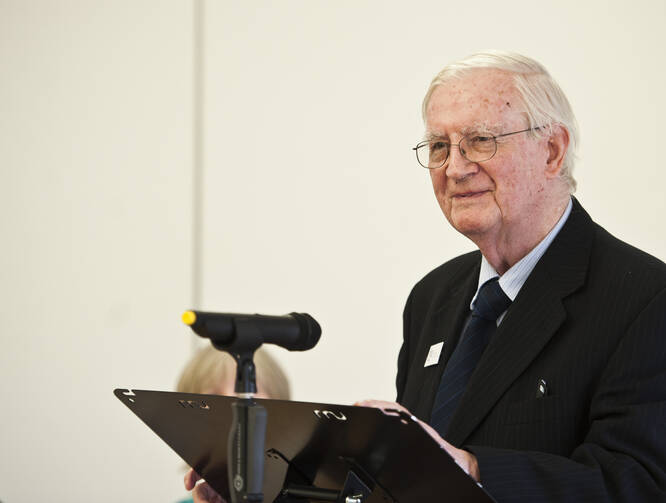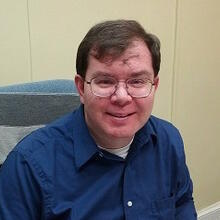Rev. Enda McDonagh, a renowned Irish priest and theologian, died on Feb. 24 at the age of 90 after suffering a fall. Irish president Michael D. Higgins said upon hearing the news of McDonagh’s death that he always enriched events “with his generous and deep, compassionate scholarship.”
Father McDonagh was born on June 27, 1930 in the small farming village of Bekan in the west of Ireland. The future chaplain to Irish president Mary Robinson and an advisor to an Irish prime minister, he recognized his vocation and avocation early on, pursuing both the priesthood and academia. After attending St. Jarlath’s College in Tuam, he went on to the Irish national seminary at Maynooth, where he obtained a bachelor of science degree in 1951 and was ordained in 1955. Postgraduate studies followed at Maynooth, where he obtained a doctorate in theology in 1957. He would later earn a degree at the Pontifical University of Saint Thomas Aquinas (the Angelicum) in Rome, and then a second doctorate in Munich in 1960.
In 1958, he was appointed professor of moral theology and canon law at Maynooth, a position he would hold until his retirement in 1995. Over time, he acquired a reputation as a progressive theologian. He was an active supporter of ecumenism, to the point that he conducted ecumenical retreats with the Church of Ireland and other Anglican clergy. He was also the founder of the InterChurch Association of Moral Theology in the 1960s. For his ecumenical work, he was made an honorary canon of St. Patrick’s Cathedral in Dublin in 2007.
Irish president Michael D. Higgins: Father McDonagh always enriched events “with his generous and deep, compassionate scholarship.”
Another of Father McDonagh’s strong interests was the relationship between church and state; in this regard he was strongly influenced by the American Jesuit John Courtney Murray. His evolving views on church/state relationships would be of great assistance to Irish prime minister Garret FitzGerald during his tumultuous tenure as Taoiseach in the 1980s.
During the AIDS crisis, Father McDonagh was critical of the Catholic Church’s refusal to condone the use of contraceptives to prevent the spread of the disease. As he recalled in an interview in 2008, he considered himself a “critical but loyal member of the Church.” Further, “I got angry at times about certain things and wrote about them fairly strongly, but at the same time I wanted to be a priest of the Church.” Because of his reservations about Pope Paul VI’s 1968 encyclical on contraception, “Humanae Vitae,” he ran afoul of the powerful archbishop of Dublin, John Charles McQuaid.
Among his many accomplishments, he sat in the Irish Senate for the National University of Ireland and was a member of the Higher Education Authority. Beginning in 1988, he served a three-year term as president of The Irish Association for Cultural, Economic and Social Relations. He was also chairman of the governing body of University College Cork in 1999, and a year later was given an honorary doctorate by that university. Trinity College in Dublin also gave him an honorary doctorate of divinity in 2001.
"Spreading the Gospel is a bit like fighting climate change; it’s not going to be done by experts."
A prolific author of books and articles, Father McDonagh was concerned with anything that intersected with the Irish church and society, be it the Troubles of Northern Ireland, Vatican II, the status of women in Irish society, liberation theology or ecumenical relations. Known for his good humor, he did not let clerical criticism deter him from what he deemed important. He was devoted to the priesthood and to the people he served. Such was his devotion to the people of Ireland—and especially to his home county of Mayo—that in 1979, he turned down a permanent appointment at the University of Notre Dame in the United States. He said that to leave Ireland would be an act of betrayal, as he believed his calling was at home.
After Father McDonagh’s death, President Higgins praised him in a public statement: “Being a most prominent and quoted defender of the right to personal conscience meant that he had to have courage, and he had it, delivering it again and again, often in circumstances where his defense of the integrity of conscience would result in exclusions, or distancing, from those for whom he had the warmest and respectful feelings, but who were adamant in their differences.”
Father McDonagh once said that in regard to the church, he took the long view:
Spreading the Gospel is a bit like fighting climate change; it’s not going to be done by experts. The experts can maybe work out what we should be doing, but it has to be taken up by us. It’s the same, it seems to me, with the preaching of the Gospel and the revitalization of the Church. It’ll have to be taken up by the people themselves, not just by clergy. Clergy can, and do, play a role, but 99 percent of the Church is lay.
In a sense, his last written work summed up his life’s work: “The Risk of God.” Father Enda McDonagh risked everything, for God’s sake.
More from America:
- The G.O.P. prizes Black Republicans — as long as they don’t alienate white members
- Interview: How the Jesuits are working to confront their history of slavery
- I’m a nun who has ministered to transgender people for over 20 years. These are some of their courageous stories.
- Farewell Lawrence Ferlinghetti, the non-conforming Catholic poet who inspired Bob Dylan and Thomas Merton










